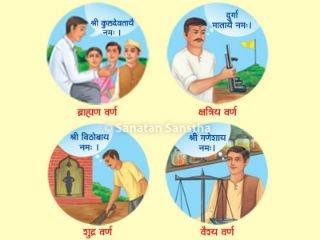The importance of Gruhasthashram (The stage of a married householder) is explained in the Holy texts Mahabharat and Ramayaṇ as ahead.
A. गृहस्थस्त्वेष धर्माणां सर्वेषां मूलमुच्यते । – Mahabharat, Parva 12, Adhyaya 234, Shloka 6
Meaning : A householder is the support for all types of Dharma.
B. यथा नदीनदाः सर्वे सागरे यान्ति संस्थितिम् ।
एवमाश्रमिणः सर्वे गृहस्थे यान्ति संस्थितिम् ।। – Mahabharat, Parva 12, Adhyaya 295, Shloka 39
Meaning : Just as all small rivulets and big rivers finally merge into the sea, the householder too is the support of individuals undergoing all other stages of life.
C. यथा मातरमाश्रित्य सर्वे जीवन्ति जन्तवः ।
एवं गार्हस्थ्यमाश्रित्य वर्तन्त इतराश्रमाः ।। – Mahabharat, Parva 12, Adhyaya 269, Shloka 6
Meaning : Just as all living creatures survive with the support of their mother, people in all other stages of life depend on the stage of the householder.
1. Origin and meaning of word ‘atithi’
‘अतिथिर्ना गृहागते ।’, meaning, an individual visiting our home is called an atithi (Guest) (according to the Amarkosha). ‘सततं गच्छति इति ।’, meaning, one who continuously walks. ‘अध्वनीनोऽतिथिर्ज्ञेयः ।’, meaning, a traveller is referred to as a guest. ‘नास्ति तिथिर्यस्य सः’, meaning, one who visits unexpectedly at any time may be called a guest. A guest is called atithi because he does not stay with someone the whole day (tithi).

2. Importance of serving guests
The Atharvaveda says that serving a guest is a Yadnya (Sacrificial fire) by itself. The custom of considering a guest as God and serving him has been prevalent since the Vedic times. Sage Parashar says,
प्रियो वा यदि वा द्वेष्यो मूर्खः पण्डित एव वा ।
वैश्वदेवे तु सम्प्राप्तः सोऽतिथिः स्वर्गसङ्क्रमः ।। – Parasharsmruti, Adhyaya 1, Shloka 40
Meaning : Irrespective of whether a guest is a friend or a foe, a foolish or a learned one, he who arrives at the time of the ritual of Vaishvadev (A ritual of offering oblation to Agni, the Deity of Fire, performed daily before a meal) bestows heavenly merits upon the host.
If one does not offer a meal to a deserving guest despite having the ability to do so, one incurs sin; this is not so if the guest is undeserving. However, if he too is offered a meal, then one acquires merits.
Yogis (Ascetics) and Siddha (Evolved beings) roam on the earth in the form of Brahmans. A host has to take atonement if he eats a meal without serving a Brahmachari and a Yati (Ascetic). The old Harit says, ‘When an Ascetic dines at one’s home, it is actually Shrihari who is doing so. If he spends a night with a householder, the host is cleansed of all his sins’. On the contrary, the host who dines before serving a guest loses his wealth as well as his merits.
Objectives : Serving a guest is the chief Dharma of a householder. In ancient times, there were no amenities such as roads and vehicles. People would embark on pilgrimages or journeys on foot. They were compelled to halt at someone’s house for lunch and to retire for the night. The scriptures on Dharma have given the responsibility of providing food and shelter to such travellers to the Gruhasthashramis, thus making their journey pleasurable.
3. Act of serving the guest
One should wait for the arrival of a guest in the courtyard of the house after the ritual of Vaishvadev for a period of one-eighth of a muhurt, referred to as the period of godohan (The time required to milk a cow) (Markanḍeyapuraṇ, Adhyaya 29, Shloka 24, 25). One should perform the following acts in honour of a guest – welcome him, offer water to wash his feet, offer him a seat, keep a lit lamp in front of him, serve him a meal, give him a place to stay and a mattress to sleep on etc. and attend to him personally. Depending on one’s ability, if one offers food or even water or a mattress to a guest, then the duty of serving a guest is fulfilled. Manu clearly says –
तृणानि भूमिरुदकं वाक्चतुर्थी च सूनृता ।
एतान्यपि सतां गेहे नोच्छिद्यन्ते कदाचन ।। – Manusmruti, Adhyaya 3, Shloka 101
Meaning : If one cannot afford to serve a meal to a guest, then he should at least be offered a seat made from grass. If even this is not available, then he should be asked to sit on plain ground, and if even this is not feasible, then one should enquire about his well-being. At least this should be followed in the homes of virtuous people.
If the host is not at home, then his wife should honour the guest.
Bidding farewell to guest : One should accompany the guest to the place where his vehicle is parked or till the lake, temple, river or border of the village, and then circumambulating him, should say, ‘I bid you farewell until we meet again’ (Dharmasutra written by Shankha).
4. What should be done if there is no guest ?
One should serve a Brahman or if even this is not possible, a cow should be fed till it is contented.

 What is the objective of Ashramvyavastha?
What is the objective of Ashramvyavastha? Why is Shudra varna considered to be the supreme one?
Why is Shudra varna considered to be the supreme one? What bhav should one possess while giving an offering?
What bhav should one possess while giving an offering? Awakening of Dharma in the Nation – superiormost duty of Brahman varna
Awakening of Dharma in the Nation – superiormost duty of Brahman varna Importance of abiding to conduct as per Chaturvarna in Kaliyug
Importance of abiding to conduct as per Chaturvarna in Kaliyug Ultimate purpose of Chaturvarna is to obtain Anand
Ultimate purpose of Chaturvarna is to obtain Anand